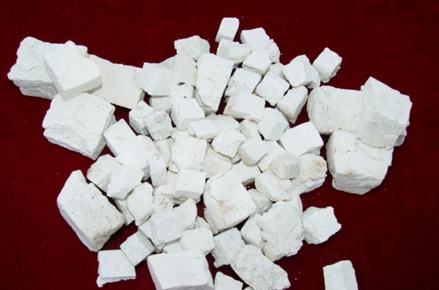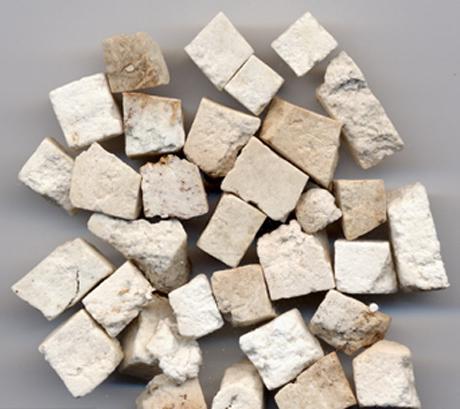Fu Ling
The Processing of Fu Ling
Origin
Sclerotium of eumycete Poria cocos (schw) Wolf of family Polyporaceae. The sclerotium mostly parasitizes on the root of Japanese red pine and pinus massoniana Lamb.
Location
Yunnan, Anhui, Hubei, and Sichuan provinces, etc. of China.
Harvest
Dug and collected from July to September.
The true smell and taste
No smell, bland taste.
Best quality
Large, firm, brown skin, with white exquisite cross section, and strong in
sticking tooth.
Processing
Slightly steamed after infiltrated, cut white part into pieces, dried in the sun, unprocessed.
The Effect of Fu Ling
Property
Sweet, bland, neutral; heart, spleen, and kidney meridians entered.
Actions
Induce diuresis and drain dampness, invigorate spleen and induce tranquilization.
Indications
A. Edema and dysuria
It can induce diuresis and drain dampness to eliminate the pathogens, and invigorate spleen to reinforce healthy. Its property is mild, tonic but not stagnant, and diuretic without consumption. It is an essential herb for inducing diuresis and alleviating edema. For various edema no mater cold, heat, deficiency or excess types, it is usually combined with Zhu Ling to mutually promote the effect of inducing diuresis and draining dampness. And the combination with other herbs depends on differentiation. For edema and dysuria due to water-damp retention, it is usually combined with Zhu Ling, Ze Xie, Bai Zhu, Gui Zhi such as in Wu Ling San from Shang Han Lun. For edema due to spleen and kidney deficiency, it is usually combined with yang-warming and diuresis-inducing herbs. For instance, it is combined with Fu Zi and Sheng Jiang in Zhen Wu Tang from Shang Han Lun. For the water-heat accumulation syndrome, edema due to yin deficiency and dysuria, it is combined with yin-tonifying and diuresis-inducing herbs. For instance, it is combined with Zhu Ling, E Jiao and Ze Xie in Zhu Ling Tang from Shang Han Lun. For edema due to spleen deficiency, it is usually combined with qi-tonifying and spleen-invigorating and diuresis-inducing herbs such as Bai Zhu, Huang Qi to mutually reinforce.
B. Spleen deficiency syndrome
This herb is mild to invigorate spleen. For all the syndromes due to spleen deficiency, it is always combined with Ren Shen and Dang Shen as their assistant. For instance, it is combined with Ren Shen, Bai Zhu, and Gan Cao in Si Jun Zi Tang which is the main spleen and stomach-tonifying formula from Tai Ping Hui Min He Ji Ju Fang. Spleen controls body fluid circulation. The dysfunction of spleen can lead to water-damp retention easily. It is good at inducing diuresis and tonifying spleen, so it is usually combined with qi-tonifying and spleen-invigorating herbs and damp-drying and diarrhea-checking drugs. For instance, it is combined with Ren Shen, Bai Zhu, and Yi Yi Ren in Shen Ling Bai Zhu San from Tai Ping Hui MIn He Ji Ju Fang, and indicated for indigestion, borborygmus and diarrhea due to spleen deficiency with damp harassment.
C. Palpitation and insomnia
It has the action of inducing tranquilization and is indicated for palpitation and insomnia caused by different causes. For palpitation, insomnia, and amnesia due to qi and blood deficiency or spleen-heart deficiency, it is usually combined with qi-tonifying, blood-nourishing herbs and tranquilizers. For instance, it is combined with Huang Qi, Dang Gui, and Yuan Zhi in Gui Pi Fang from Ji Sheng Fang. For restlessness and fear due to heart-qi deficiency, it is usually combined with heart-qi-tonifying herbs and settling tranquilizers. For instance it is combined with Ren Shen, Yuan Zhi, and Long Chi in An Shen Ding Zhi Wan from Yi Xue Xin Wu.
D. Phlegm-fluid retention
It can invigorate spleen, drain and excrete water-damp to prevent the retention of damp and production of phlegm. And it can also calm heart and induce tranquilization. So it is suitable for syndrome of spleen deficiency with fluid-retention or syndrome of attack of heart by retained water manifested as fullness in the chest and hypochondrium, palpitation and dizziness, and cough with shortness of breath. It is usually combined with spleen-invigorating, dampness-drying, heart-yang-warming herbs. For instance it is combined with Gui Zhi, Bai Zhu, and Gan Cao in Ling Gui Zhu Gan Tang from Jin Kui Yao Lue. For vomiting due to fluid retention in stomach, it should be combined with herbs of directing qi downward and arresting vomiting. For instance it is combined with Ban Xia and Sheng Jiang in the Xiao Ban Xia Jia Fu Ling Tang from Jin Kui Yao Lue. Because it is good at invigorating spleen and draining dampness, it is indicated for phlegm-damp syndrome. For instance, it is used in Er Chen Tang from Tai Ping Hui Min He Ji Iu Fang to reinforce the dampness-drying and phlegm-resolving actions of Ban Xia and Chen Pi.
Dosage and Administrations
Decoct 9~15 g.
Cautions
It is contraindicated for spermatorrhea due to deficiency-cold.

